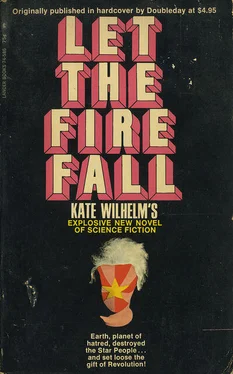Kate Wilhelm - Let the Fire Fall
Здесь есть возможность читать онлайн «Kate Wilhelm - Let the Fire Fall» весь текст электронной книги совершенно бесплатно (целиком полную версию без сокращений). В некоторых случаях можно слушать аудио, скачать через торрент в формате fb2 и присутствует краткое содержание. Город: New York, Год выпуска: 1969, Издательство: Lancer Books, Жанр: Фантастика и фэнтези, на английском языке. Описание произведения, (предисловие) а так же отзывы посетителей доступны на портале библиотеки ЛибКат.
- Название:Let the Fire Fall
- Автор:
- Издательство:Lancer Books
- Жанр:
- Год:1969
- Город:New York
- ISBN:нет данных
- Рейтинг книги:5 / 5. Голосов: 1
-
Избранное:Добавить в избранное
- Отзывы:
-
Ваша оценка:
- 100
- 1
- 2
- 3
- 4
- 5
Let the Fire Fall: краткое содержание, описание и аннотация
Предлагаем к чтению аннотацию, описание, краткое содержание или предисловие (зависит от того, что написал сам автор книги «Let the Fire Fall»). Если вы не нашли необходимую информацию о книге — напишите в комментариях, мы постараемся отыскать её.
The first man to reach the spaceship was Obie Cox. Until then Obie had been known only for the possession of one of the most beautiful male bodies in creation.
After the spaceship, Obie Cox became known throughout the world. Obie was touched by the hand of God, and that hand lay heavy on him. But he knew his duty was to carry the message placed in his hands to the world… the strong message, the truthful message… the message of hate!
Let the Fire Fall — читать онлайн бесплатно полную книгу (весь текст) целиком
Ниже представлен текст книги, разбитый по страницам. Система сохранения места последней прочитанной страницы, позволяет с удобством читать онлайн бесплатно книгу «Let the Fire Fall», без необходимости каждый раз заново искать на чём Вы остановились. Поставьте закладку, и сможете в любой момент перейти на страницу, на которой закончили чтение.
Интервал:
Закладка:
Merton went to Wanda’s desk and pressed a button. In a moment the outer office door opened and a woman entered carrying a covered tray. She put it down behind Lorna. The girl sat stiffly, looking ahead. No one said anything. She could hear movements behind her, and she jerked when a cloth was whipped out before her and fastened around her neck.
“No!” She screamed then and tried to rise. Merton slapped her hard and she knew the reason for the high-back chair. She was pressed back to it, and the cloth about her was fastened, pinioning her arms, clamping her to the chair. She closed her eyes and tears squeezed through her eyelids and ran down her cheeks. The woman cutting her hair was fast; it was not a glamor cut, was not meant to be such, but Lorna’s hair was curly, like her mother’s, and she really looked better with the very short, curly mass of gold than she had with it hanging free. Wanda said angrily to the woman with the scissors, “Shorter, you fool!” More was taken off and by then Lorna had a very boyish haircut. Her cheekbones were high and wide, her nose very straight and fine, and her mouth firm and beautifully shaped. She looked like an idealized Joan when they finished with her. She felt the cloth being removed and she sat without moving while the sounds indicated that the woman was gathering her equipment.
“Stand up.” Merton’s voice, very tight, cold.
“Strip.” Wanda’s voice, angry, vengeful, petulant. She didn’t like the way Lorna kept improving under their punishment.
Lorna began fumbling with the buttons and the belt. She removed the shirt, then her shoes, the pants, and stood before them in her bra and underpants. “All of it,” Merton said, still very cold.
Lorna finished. She didn’t open her eyes until she was naked. She looked then at fat Wanda, and from her to cold Merton, and she shivered under their eyes. She made no motion to cover herself, but stood straight, with dignity. “I didn’t do anything,” she said. “You know I didn’t, both of you.” She was told to turn around and march. They took her out the wide double doors of the mansion, and lining the walk, stretching out of sight between trees, were the campers, boys and girls alike, each holding a small handmade broom of wire grass. When they saw her the youngsters started shouting and screaming: “Blasphemer! Heretic! Betrayer! Nonbeliever! Short hair!”
They whipped her. The same afternoon they took her away from Mount Laurel, dressed in a sack made of unbleached muslin, and flew her to the edge of the many towns and villages that made up metropolitan New York. The Militant Millenniumist who put her off the hovercraft handed her a credit and ID card. “Not that you have any credit,” he said coolly and spat on her,spun around, and got back on the craft and left her.
That night she made the 3D newscast. The entire sequence had been filmed, and it “Was shown, all of it. In the mountain cabin in Pennsylvania Derek saw it, and in Louisiana where Blake-Teague had his assignment, he watched it. Blake understood at once why it had been done, what they meant to accomplish, but Derek was slower. He was shutting down the cabin before he realized that Blake was trying to get through to him.
“But, goddamn it, Blake, she’s my sister! What do you think will happen to her in the city now?”
“She’s a tough cookie. She’ll survive. I tell you, she’s a plant. They want us. You and me.”
“I don’t believe that. They would use her, but not like that. Not with the whipping and all that. That’s no plant.”
“Sit tight, Derek. Let me handle it. I can get in and out without anyone’s knowing it. You stand out like a slumming playboy.”
That night crazy Teague mumbled and muttered until his partner kicked him out of their apartment. They were assigned Basin Street sector, where Catholicism was putting up a strong fight against the Church, and where nightly there were riots and vandalism that was slowly destroying that section of the city. There was no Catholic Church for forty miles that was still a complete edifice. Blake-Teague was a good man for the cause. He was devious and loved his work. He had had only good marks so far in his career as a believer.
That night, after being kicked out of the apartment, he vanished. His partner was afraid to report it, for fear of bringing down the wrath of the official who had given him this assignment. They all knew that Teague was crazy, but he was useful and valued.
Blake turned up in the city the following day, this time as a dark-haired young man whose shoes didn’t match, whose coat looked like it had been found in the dump, and whose pants had come from someone two sizes larger than he was.
Blake didn’t want to divert his attention from the problem he felt was due highest priority, that of gaining enough trust to allow him access to the ship, but neither did he want to lose Derek, who would be picked up and would talk under the care and treatment of the Church.
Probably he would have gone to find Lorna anyway. He remembered her as a brat and alternately as a very lovely young woman in his arms, dependent on him. He knew it would be very easy to fall in love with Lorna, who was so like her mother in appearance, and so like her father in determination and independence.
Anyway, Blake had taken on the job of finding her, and this he would do; in a city of thirty million people.
Chapter Twenty
NEW Year’s Eve in Times Square. Twenty million people within an area of no more then ten city blocks. Snow that comes down black, and falls like bits of metal, straight down, no swirling about, just down. Cold people, miserable people, looking for something from the New Year, something that had been absent in the old one, in the old ones of all the years gone by.
Blake has found Lorna. He has spotted the watchers, all but one of them anyway, and he is being careful, knowing that there may be others. Tonight there will be real trouble in Times Square. Everyone gathered knows this. They have come anyway. For the trouble perhaps. Obie has said that tonight the short hairs will be driven from the city, that the city will greet the new year cleansed of the filth of the non-believers. At least some say that Obie has predicted this. No one knows any longer when he has made a prediction, or when others have made it for him, in his name. False prophets, the long hairs call those others, trying to belittle the accomplishments of the leader. Hedging his bets, the skeptics say with as much certainty. If it pans out, he said it sho-nuff, and if it doesn’t happen, then he never even said it would. No one knows where the truth is any longer. No one really cares: They have come to Times Square in spite of the rumors, or because of the rumors. Lorna has come. Looking for something that she lost. She won’t find it again, and she knows this, too. But she has to look, or give up everything. She has a job of sorts. In a bar where short-hair Irishmen gather and talk about what they will do to the long hairs when the time comes. She serves their drinks—they don’t trust the automated bars, believe they get cheaper booze there, watered down more than in the bars where they can watch the mixing. They may be right. Everyone knows the automatic places of all sorts are programmed to cheat the customer, less food per serving, less alcohol per drink, less time per book, less everything. Lorna is in Times Square, hugging a coat that is too thin to her shoulders, which are also too thin. She is hungry. Most of the time she is hungry, and always cold. She can remember being warm enough, that is more than most of the people she is pushing and pushed by can remember. Few of them have ever been warm in the winter. Lorna’s hair is growing out again, curling about her ears. She doesn’t suspect that she has not had a moment alone since being put out of the hovercraft three months ago. She has felt alone. Loneliness has matured her in a way that age couldn’t, and her eyes are patient now and the look of hurt has been replaced by a look of sadness. She doesn’t like most of the people in the square, but she sympathizes with them. They all, long hairs and short hairs, share the hunger and the cold, and the hopes that the new year will be different. No one really knows how to specify what sort of difference he wants, but everyone knows it has to be different or he doesn’t want to stay around for the next New Year’s Eve. Most of them thought this way last year, and the year before that, and on backward in time to a distant past that is so faded in the memory that perhaps it is only a dream. Lorna never felt this before. She doesn’t know that people can live with this hopelessness for a normal life span. She wouldn’t believe it if she were told repeatedly that it is so.
Читать дальшеИнтервал:
Закладка:
Похожие книги на «Let the Fire Fall»
Представляем Вашему вниманию похожие книги на «Let the Fire Fall» списком для выбора. Мы отобрали схожую по названию и смыслу литературу в надежде предоставить читателям больше вариантов отыскать новые, интересные, ещё непрочитанные произведения.
Обсуждение, отзывы о книге «Let the Fire Fall» и просто собственные мнения читателей. Оставьте ваши комментарии, напишите, что Вы думаете о произведении, его смысле или главных героях. Укажите что конкретно понравилось, а что нет, и почему Вы так считаете.












